Did you know that CBD, a popular natural remedy, can potentially interact with certain medications and supplements? While CBD offers many potential therapeutic benefits, it’s crucial to understand how it can affect the efficacy and safety of other drugs in your system. By being aware of these interactions, you can make informed decisions and prioritize your wellness journey.
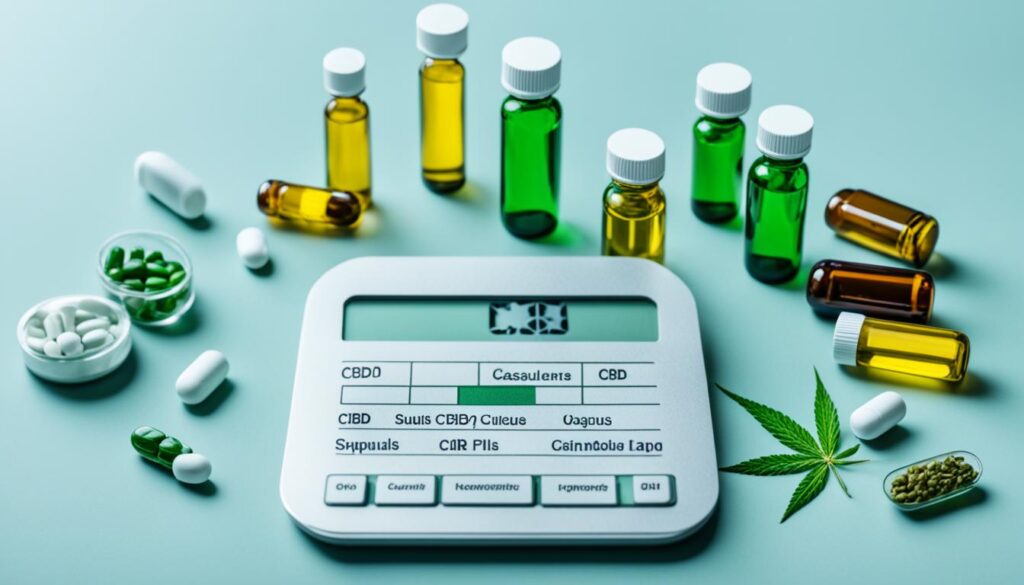
Key Takeaways:
- CBD can interact with a wide range of medications, including antiepileptic drugs, antidepressants, benzodiazepines, opioid analgesics, blood thinners, immunosuppressants, proton pump inhibitors, certain antimicrobials, and blood pressure medications.
- It’s essential to consult with your doctor before using CBD alongside these medications to ensure your safety and efficacy.
- CBD can affect the metabolism of medications through the CYP450 enzyme system in the liver, potentially leading to altered drug levels and increased side effects.
- Close monitoring, dosage adjustments, and potential medication changes may be necessary when combining CBD with certain drugs.
- Consider all the medications, supplements, and substances you are taking to avoid potential interactions and prioritize your well-being.
Understanding Drug Metabolism and CYP450 Enzymes
When you take drugs or vitamins, your body works to break them down. This is key for the drugs to work and for your body to stay in balance. The CYP450 enzyme system, mainly found in the liver, plays a big role in this.
The CYP450 enzymes break down lots of different things. This includes meds, harmful substances, and even natural things like CBD. These enzymes turn them into smaller parts that the body can get rid of easily.
CBD can both be broken down by these enzymes and affect how they work. When you take CBD, it might stop or boost certain CYP450 enzymes. This can change how other drugs are broken down. The result could be changes in how fast drugs leave your body.
To understand drug interactions, consider this:
Imagine taking CBD oil and another drug that needs the same CYP450 enzyme to break down. CBD might fight for the enzyme, making the drug stay in your body longer. This could make drug levels too high and increase side effect risks.
If CBD boosts the enzyme that breaks down a drug, it might lower the drug’s levels. This could reduce the drug’s effectiveness.
Not every medication needs CYP450 enzymes to be broken down. But a lot of common drugs do. This is why it’s vital to know about possible drug interactions when using CBD with other meds.
Next, we’ll look at how CBD might interact with some usual medications. These include drugs for epilepsy, depression, anxiety, pain, blood clotting, immune system, stomach acid, infections, and blood pressure. Understanding these can help you use CBD safely with other meds.
Potential Drug Interactions with CBD
CBD has health benefits, but we must know about its interactions with medications. Mixing CBD with certain drugs can change how they work. It’s key to be cautious for your safety. Some medications that may interact with CBD include:
Antiepileptic Drugs:
CBD can affect antiepileptic drugs like carbamazepine and oxcarbazepine. This can lead to lower CBD effects or more side effects. It’s vital to watch closely and maybe adjust doses when using CBD with these drugs.
Antidepressants:
Antidepressants like TCAs and SSRIs may not work well with CBD. This is because CBD can slow down their breakdown, increasing their levels in your blood. This can cause more side effects. Using CBD with antidepressants needs careful thought due to their shared side effects.
Benzodiazepines:
Be careful with CBD and benzodiazepines. CBD can slow their breakdown too, raising their levels in your blood. This means you need to monitor them closely to avoid bad side effects and coordination issues.
Opioid Analgesics:
Using CBD with opioids like morphine can raise their levels. Since both can affect the nervous system, using them together needs extra caution.
Blood Thinners:
Blood thinners like warfarin and clopidogrel can also be affected by CBD. This might increase their levels and risk of bleeding. Regular checks are needed to avoid any problems when using CBD with blood thinners.
Immunosuppressants:
When using CBD with drugs like tacrolimus and cyclosporine, be cautious. CBD can raise their levels, leading to toxicity and more side effects. It’s crucial to consider the risk of infections when combining CBD with immunosuppressants carefully.
Proton Pump Inhibitors, Antimicrobials, and Other Medications:
CBD can also interact with drugs like proton pump inhibitors and certain antimicrobials. Consulting your healthcare provider is important to avoid any unwanted interactions. They can help ensure your safety when using CBD with other treatments or supplements.
Always talk to your doctor before mixing CBD with medications. This ensures a safe and beneficial wellness journey.
| Medication Category | Potential Interactions with CBD |
|---|---|
| Antiepileptic Drugs | AED efficacy may decrease or side effects may increase |
| Antidepressants | Increased blood levels and potential side effects |
| Benzodiazepines | Increased blood levels and potential side effects |
| Opioid Analgesics | Increased blood levels and potential side effects of opioids |
| Blood Thinners | Potentially increased blood levels and higher risk of bleeding |
| Immunosuppressants | Increased blood levels and potential toxicity |
| Proton Pump Inhibitors | Potential interactions with CBD |
| Antimicrobials | Potential interactions with CBD |
| Other Medications | Potential interactions with CBD |
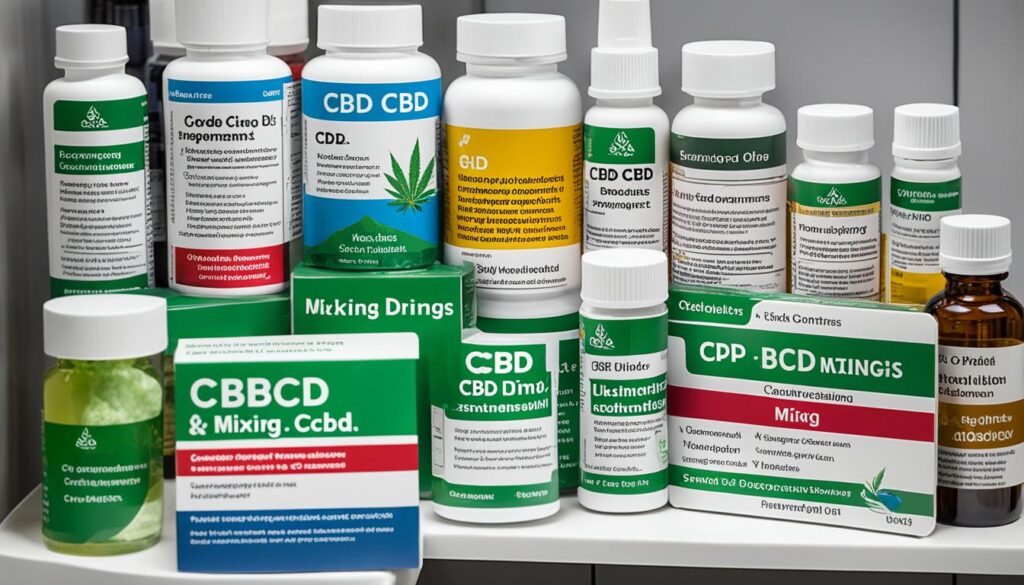
CBD and Antiepileptic Drugs
CBD is often paired with antiepileptic drugs (AEDs) to help control seizures and epilepsy. But, you must know about possible interactions between CBD and these medications. Some AEDs, such as carbamazepine, oxcarbazepine, phenobarbital, and phenytoin, can affect how CBD works.
When CBD and these AEDs are used together, they might change how the body handles them. This could make the CBD less effective or cause more side effects. It’s key for anyone using CBD and AEDs to know about these issues. They should also talk to their doctor to make sure their treatment plan is both safe and effective.
If you’re taking CBD with AEDs, your doctor might need to watch you more closely. Sometimes, they may need to adjust your doses. By talking with a healthcare professional, you can find the right CBD dose. This helps get the best results without risking the effectiveness or safety of your AEDs.
| AEDs | Potential CBD Interactions |
|---|---|
| Carbamazepine | Decreased CBD Levels or Increased Side Effects |
| Oxcarbazepine | Decreased CBD Levels or Increased Side Effects |
| Phenobarbital | Decreased CBD Levels or Increased Side Effects |
| Phenytoin | Decreased CBD Levels or Increased Side Effects |
It’s vital for AED users to talk about CBD with their doctor. The doctor can look into how CBD and AEDs might interact for you. They can suggest what’s best based on your health and medical history.
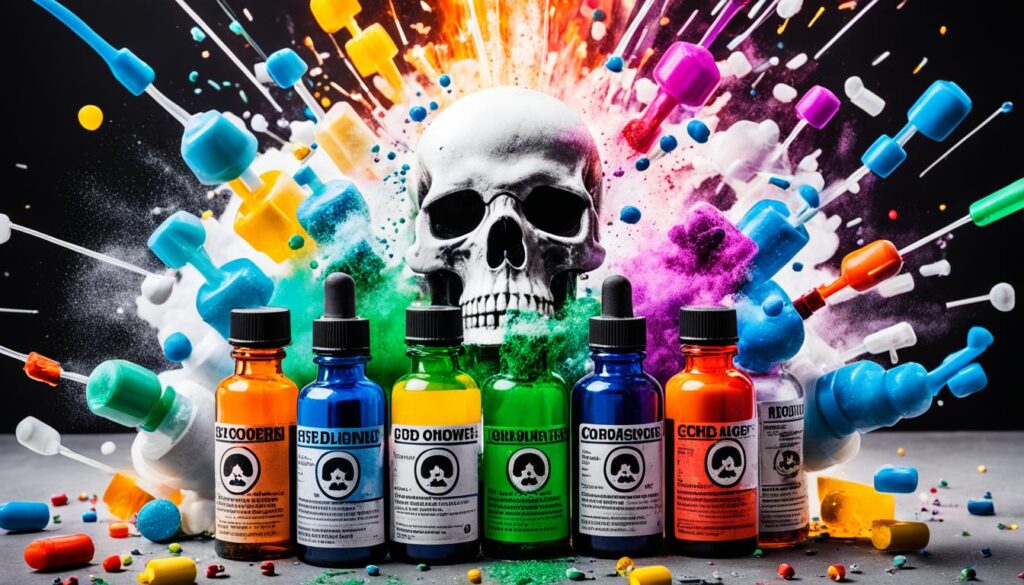
CBD and Antidepressants
When using CBD with antidepressants, it’s key to know about drug interactions with CBD and CBD contraindications. CBD may affect how antidepressants, like tricyclic antidepressants (TCAs) and selective serotonin reuptake inhibitors (SSRIs), work.
CBD impacts how the body processes antidepressants. It may slow down the breaking down of these medications by inhibiting cytochrome P450 enzymes. This can raise the levels of antidepressants in the blood, which might lead to side effects.
“CBD’s interaction with antidepressants can increase blood levels of these medications, potentially intensifying their effects and increasing the risk of adverse reactions.”
CBD and antidepressants could both make you feel drowsy or dizzy. Using them together may make these feelings stronger. This can affect how you go about your day and your overall health.
Consult Your Healthcare Provider
Before combining CBD with antidepressants, talk to your healthcare provider. They can help you understand the risks and benefits. They will consider your health history and current medications.
Getting advice from professionals helps you make safe choices about using CBD and antidepressants. Always keep the lines of communication open with your healthcare provider to stay safe and healthy.
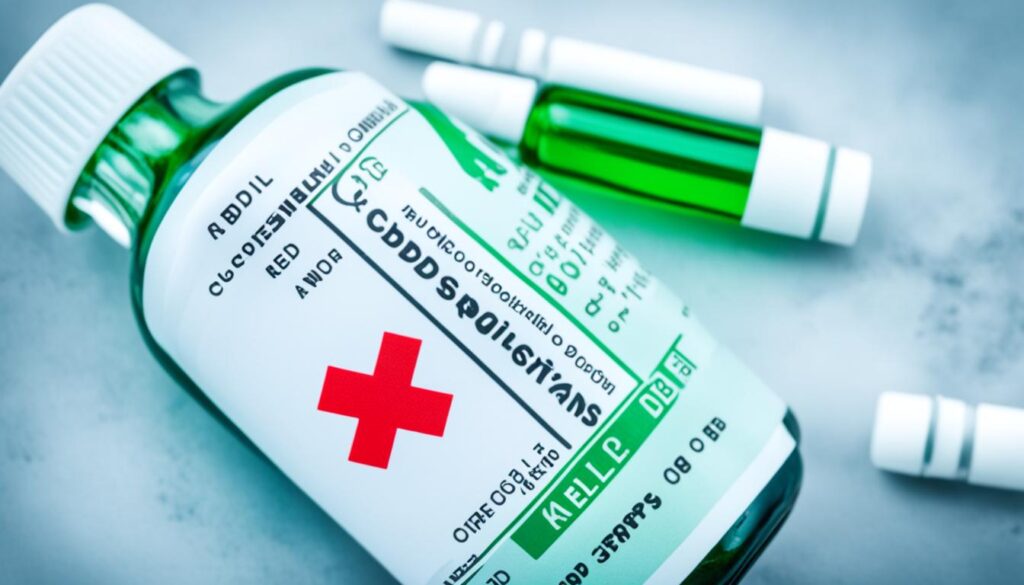
| Antidepressant | Interactions with CBD |
|---|---|
| Tricyclic Antidepressants (TCAs) | Potential increase in blood levels and side effects when combined with CBD |
| Selective Serotonin Reuptake Inhibitors (SSRIs) | Potential increase in blood levels and side effects when combined with CBD |
CBD and Benzodiazepines
Using CBD with benzodiazepines requires careful monitoring. CBD changes how benzodiazepines work in the body, which might increase their effects. If you use benzodiazepines for anxiety or other issues, knowing about this interaction is key.
Benzodiazepines, like Xanax, Valium, and Ativan, are drugs that doctors prescribe often. They boost the brain’s GABA neurotransmitter, easing anxiety, aiding relaxation, and helping with sleep. But, when used with CBD, these effects might feel stronger.
Talking to your doctor before adding CBD to your routine is important. They can adjust your dose and watch how you respond to the mix.
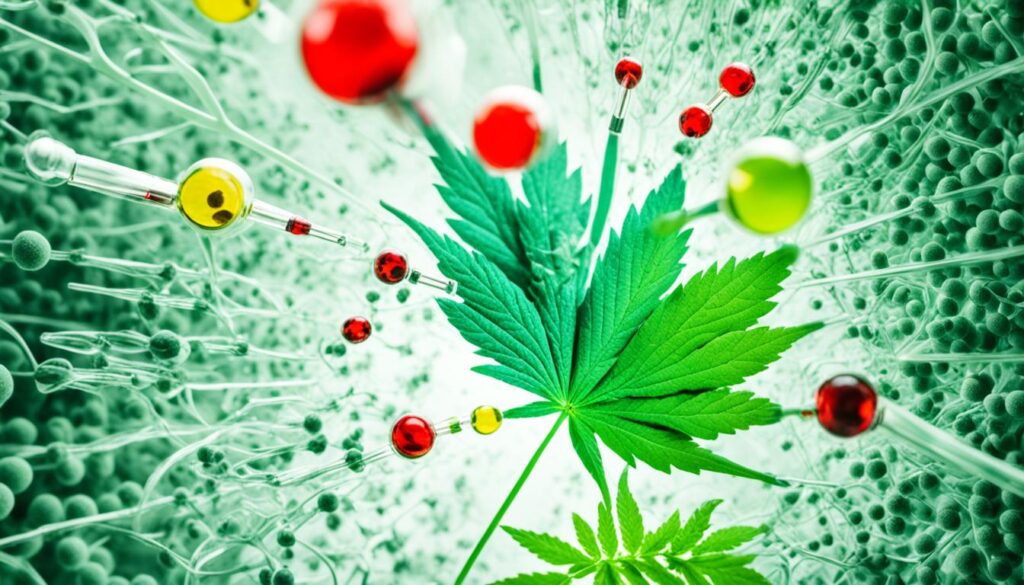
It’s vital to watch your reaction closely when combining CBD with benzodiazepines. This helps avoid serious side effects and problems with coordination.
The mix of CBD and benzodiazepines can make you feel more sedated and drowsy. So, it’s crucial not to drive or use heavy machines until you know how they impact you. This combination might also make you feel more confused, have trouble focusing, and affect your thinking.
Considering CBD with benzodiazepines? Make sure to talk openly with your doctor. They can weigh the risks and benefits, guiding you to the safest treatment for you.
CBD and Opioid Analgesics
If you’re thinking of using CBD with opioid painkillers like morphine, be careful. CBD can interact with these drugs, causing their levels in your blood to rise. This can lead to more side effects. Since CBD and opioids affect the brain similarly, using them together needs caution.
Studies show CBD can change how your body handles opioids. This means you could have more opioids in your blood than expected. Higher levels can increase the chance of side effects and negative reactions. So, always talk to your doctor before mixing CBD with opioid pain medicines.
Mixing CBD with opioids means your doctor needs to watch you closely. They’ll need to figure out the safest doses of both for you. Working with your medical team lets you make smart choices about managing your pain safely.
“Caution should be exercised when using CBD alongside opioid analgesics due to their potential interactions and shared CNS effects.”
Potential Side Effects and Risks
Combining CBD and opioids could cause:
- Increased sedation and drowsiness
- Respiratory depression
- Dizziness and lightheadedness
- Impaired cognitive function and motor coordination
- Elevated risk of overdose
Be on the lookout for these side effects. If they occur, get medical help right away. Keep your healthcare provider informed to use CBD and opioids the right way.
Consult Your Healthcare Provider
Thinking about using CBD with opioid painkillers? Talk to your doctor first. They will consider your health history, other meds, and needs. This ensures you get the best advice tailored to you.
| Medication | Interaction |
|---|---|
| Opioid Analgesics (e.g., morphine) | Increased blood levels and potential side effects |
| CBD | The ability to interact with opioids |
Making informed choices and staying in touch with your doctor are key when using CBD and opioids together. By teaming up with your healthcare providers, you can focus on your health and make safe choices for your pain treatment.
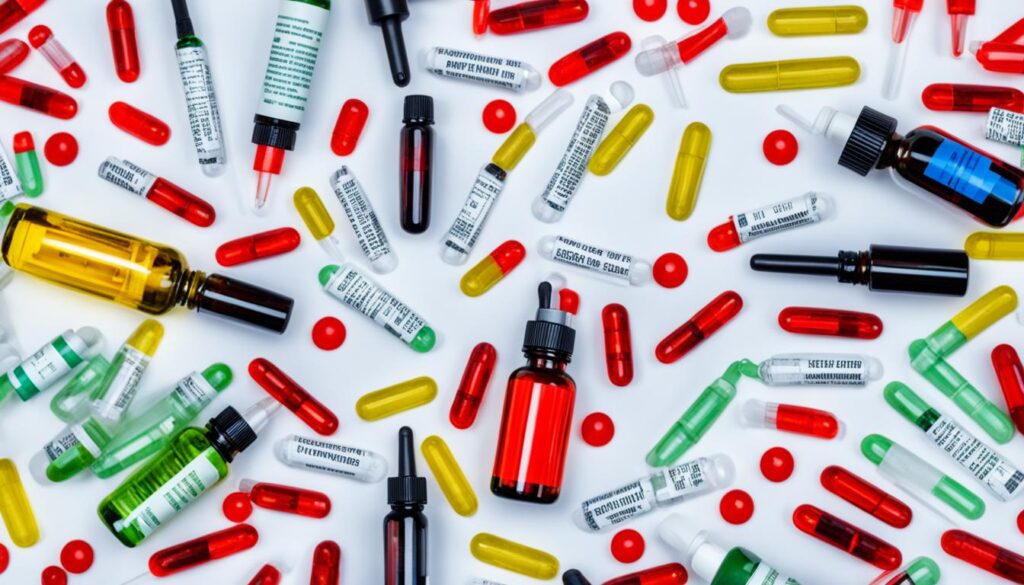
CBD and Blood Thinners
Using CBD with blood thinners like warfarin and clopidogrel needs careful thought. CBD can change how these meds work. This can lead to more drugs in the blood and a higher bleed risk.
For those on blood thinners, watching how much CBD you use is key. It’s smart to check in often with doctors to stay safe. They can help avoid any bad side effects.
The interaction between CBD and blood thinners can be worrying. But don’t let it stop you from seeing if CBD helps you. Just be sure to talk it over with your doctor. Especially if you already use blood thinners or other medicines.
Common Blood Thinners and Potential Interactions with CBD
| Blood Thinners | Potential Interactions with CBD |
|---|---|
| Warfarin | Increased blood levels of warfarin, leading to a higher risk of bleeding |
| Clopidogrel | Potential interference with the metabolism of clopidogrel, potentially affecting its effectiveness and increasing the risk of bleeding |
| Heparin | Insufficient evidence regarding CBD interactions with heparin; consult with healthcare professionals |
The table above isn’t the full story but gives a basic idea. How CBD affects you might be different. Talking to a healthcare pro is the best way to get advice for your case.
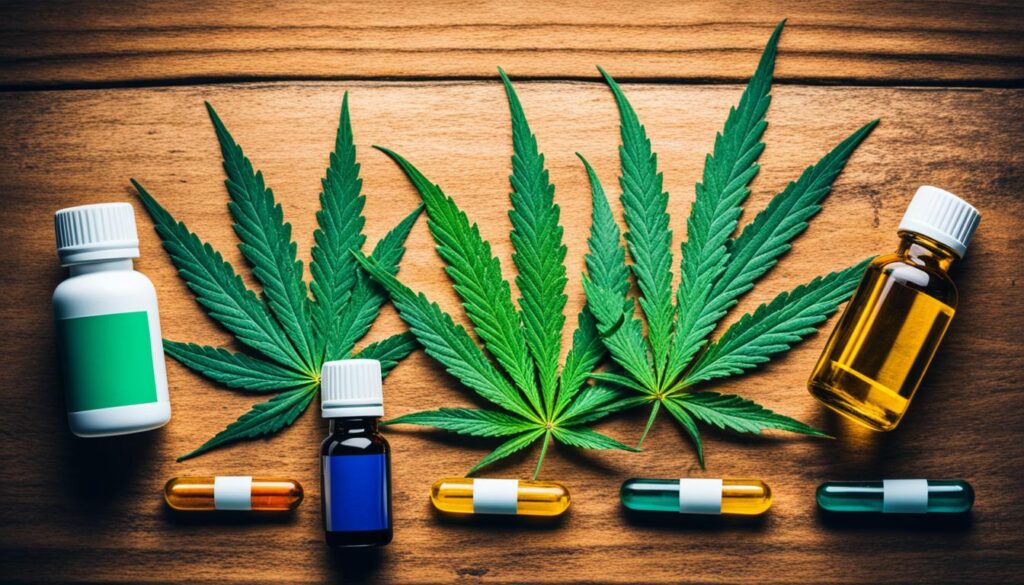
Being aware and proactive about CBD and blood thinner interactions is important. Make sure you talk openly with your doctor. This will help keep your health journey both safe and effective.
CBD and Immunosuppressants
CBD might change how well some immunosuppressants work. These include drugs like tacrolimus and cyclosporine. If CBD makes these drugs stay in the blood longer, it could cause too many side effects. It’s vital to watch this closely to avoid health issues.
Doctors often give immunosuppressants to those with new organs or certain diseases. These include rheumatoid arthritis or lupus. The drugs lower the immune system’s activity. This stops the body from harming transplanted organs or helps with autoimmune disease swelling.
CBD could help with some health problems, but it can affect how immunosuppressants work. This might lead to a higher chance of getting serious infections. Since immunosuppressants weaken the immune system, people can get sick easier.
Doctors need to watch patients taking CBD and immunosuppressants closely. This ensures they stay safe and healthy. Telling doctors about using CBD helps them plan the best treatment options.
Talking with doctors about using CBD with these medicines is key. This step is crucial for handling any possible issues. It helps in managing the disease and using CBD in the best way.
Summary:
CBD may raise the levels of certain immunosuppressant drugs, leading to more side effects. Mixing CBD with these drugs requires careful thought and observation. Clear discussions with doctors are essential to balance the risks and benefits, ensuring safety when using both CBD and immunosuppressant medications.
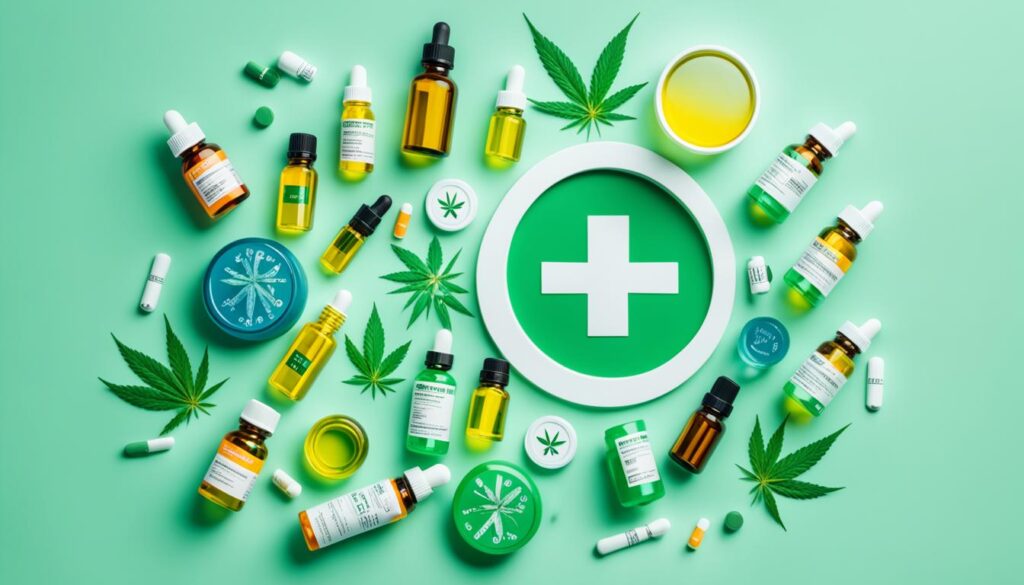
CBD and Other Interactions to Consider
CBD can interact with many substances. This includes proton pump inhibitors and certain antimicrobials. It also interacts with herbal and dietary supplements, alcohol, and other drugs.
Always talk to your healthcare provider before using CBD. Tell them about all the medications and supplements you’re taking. This ensures you stay safe and avoid bad interactions. Your healthcare provider can offer personal advice for your situation.
Some supplements can affect your body like CBD does. This can lead to unwanted effects or change the benefits you get from CBD. Discuss all your supplements with your healthcare provider. Then, you can decide which ones to continue or adjust.
Your healthcare provider’s guidance is key when using CBD. They can help you understand how CBD interacts with other substances. Always communicate with them clearly. This will help you get the most from CBD while keeping risks low.